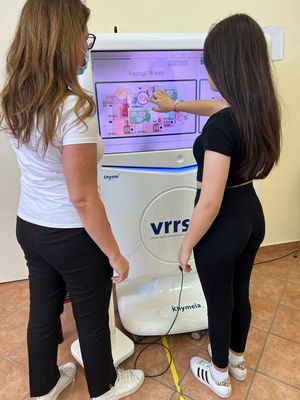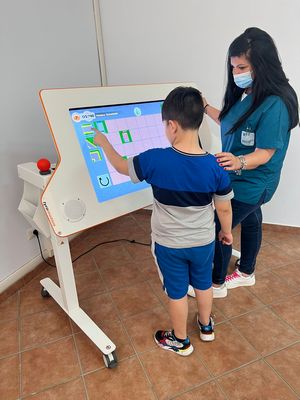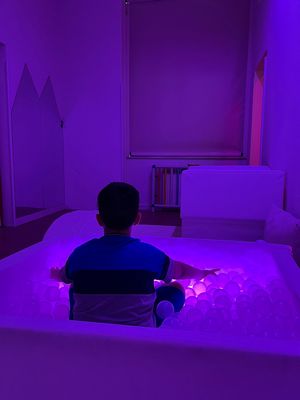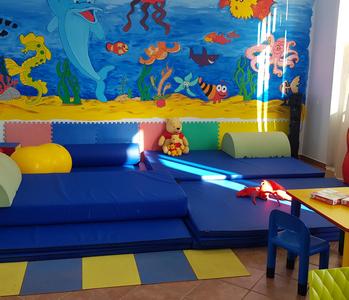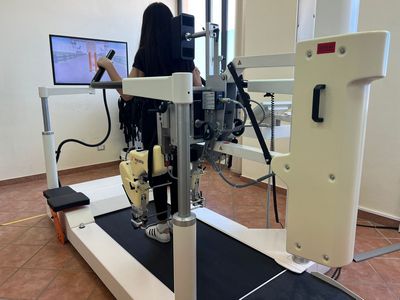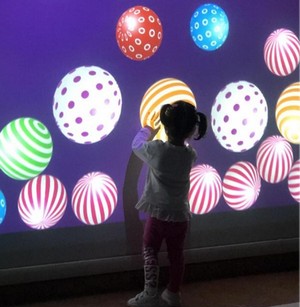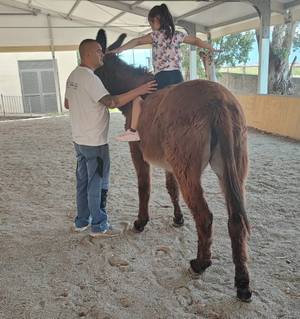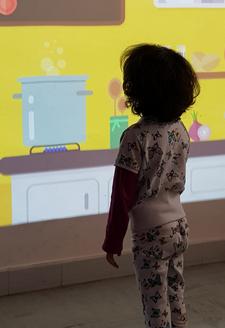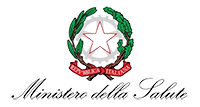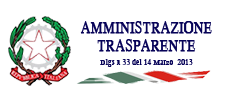Bioparco delle intelligenze e delle neurofragilita
Ultimo aggiornamento: 21 Giugno 2024
Presso il Bioparco delle Intelligenze e delle Neurofragilità sito in Via Vincenzo Leanza c/o Istituto Marino di Mortelle - 98164 Messina è attivo un ambulatorio di Neuropsichiatria infantile al cui interno vengono svolte tutte le attività ad esso connesse (somministrazione test, effettuazione esami elettro encefalografici in veglia ed in sonno, esami otorinolaringoiatrici, terapie cognitive-comportamentali e di Neuropsicomotricità, terapie occupazionali e di gruppo finalizzate a facilitare l’inserimento sociale del minore, pet therapy, idrokinesiterapia, attività sportiva) effettuate a scopo di ricerca scientifica. L’attività di ricerca in svolgimento sull’aspetto motorio e cognitivo si serve dell’utilizzo di devices robotizzati di ultima generazione: la camera multisensoriale, nasce come ambiente progettato per il benessere prodotto dalla stimolazione dei 5 sensi in maniera controllata ed è volta a sviluppare la percezione in pazienti con disabilità intellettive, anche gravissime; i robot umanoidi (Nao, Milo e Pepper) che sfruttano l’empatia che si crea tra i piccoli ed il robot al fine di abituare bambini autistici a meglio interagire con il mondo esterno, attraverso giochi, esercizi, training, espressioni facciali e feedback alle attività poste in essere dal paziente, sviluppando così la comunicazione verbale e non verbale.
Completano la dotazione tecnologica il Myrò, il Nirvana Pediatrico (che consente la riabilitazione in una realtà semi-immersiva) e VRRS (Virtual Reality Rehabilitation System). Descrizione a parte meritano il Lokomat pediatrico e l’Armeo Spring: con il Lokomat il paziente ha a disposizione un esoscheletro che non solo facilita i movimenti per il recupero della deambulazione, ma registra anche tutti i parametri antropometrici necessari per eseguire una valutazione dei progressi ed eventualmente aggiustare la sessione di riabilitazione. Si possono misurare velocità, frequenza, lunghezza del passo, escursione delle articolazioni del ginocchio e delle anche, ampiezza dei movimenti articolari, forza muscolare ed eventuale spasticità: con un monitoraggio costante di questi parametri, la riabilitazione può essere personalizzata sul singolo paziente e ottimizzata per facilitare la ripresa del cammino. L’Armeo Spring, invece, consente l’esecuzione di terapia per braccia e mani in un ampio spazio di lavoro 3D. Fornendo un supporto per il peso del braccio. L’Armeo Spring consente ai pazienti di utilizzare qualsiasi funzione motoria residua e li incoraggia a raggiungere un maggior numero di portata e di presa movimenti basati su obiettivi terapeutici specifici.
È inoltre previsto, sempre nell’ambito delle attività di ricerca scientifica, lo svolgimento di attività di natura riabilitativa all’aria aperta comprendente sabbioterapia, ortoterapia, talassoterapia e tutto ciò che possa servire ad analizzare l’interazione del minore con l’ambiente esterno e lo stato delle varie patologie al fine di offrire una risposta sempre migliore alle esigenze dei minori di anni 18 che siano affetti dai disturbi dello spettro autistico e dell’età evolutiva.
L’attività di ricerca comprende anche la terapia assistita con animali con l’ausilio di asini addestrati al compito di “socializzare” con i più piccoli e stimolare le loro funzioni primarie.
At the Biopark of intelligences and neurofragilities site in Via Vincenzo Leanza c/o Istituto Marino di Mortelle - 98164 Messina there is an active child neuropsychiatry clinic in which all related activities (administration of tests, conducting electro-encephalographic examinations in wakefulness and sleep, ENT examinations, cognitive-behavioral and Neuropsychomotricity therapies, occupational and group therapies aimed at facilitating the social inclusion of the child, pet therapy, hydrokinesiotherapy, sports activities) are carried out for the purpose of scientific research. The ongoing research activity on the motor and cognitive aspect takes advantage from the latest generation of robotic devices: the multisensory room, was created as an environment designed for the well-being produced by the stimulation of the 5 senses in a controlled manner and is aimed at developing perception in patients with intellectual disabilities, including very severe ones; the humanoid robots (Nao, Milo and Pepper) take advantage from the empathy created between the little ones and the robot in order to accustom autistic children to better interact with the outside world, through games, exercises, training, facial expressions with the aim of developing verbal and nonverbal communication. The Myrò, Pediatric Nirvana (which enables rehabilitation in a semi-immersive reality) and VRRS (Virtual Reality Rehabilitation System) complete the technological equipment.
It is also relevant taking into account the Pediatric Lokomat and the Armeo Spring: with the Lokomat, the patient has an exoskeleton that not only facilitates movements for walking recovery, but also records all the anthropometric parameters needed to perform a progress evaluation and possibly adjust the rehabilitation session. Speed, frequency, stride length, knee and hip joint excursion, joint range of motion, muscle strength, and possible spasticity can be measured: with constant monitoring of these parameters, rehabilitation can be tailored to the individual patient and optimized to facilitate walking recovery. The Armeo Spring, on the other hand, allows arm and hand therapy to be performed in a large 3D workspace providing arm weight support. The Armeo Spring allows patients to use any residual motor function and encourages them to achieve more reach and grasp movements based on specific therapeutic goals.
As a part of the scientific research , there are rehabilitative activities conducted in the open air including sand therapy, garden therapy, thalassotherapy and anything that may serve to analyze the interaction of the child with the external environment and the state of the various pathologies in order to offer an increasingly better response to the needs of minors (under 18 years old) who are affected by autism spectrum disorders and developmental age.
The research activity also includes animal-assisted therapy with the help of donkeys trained in order to "socialize" with toddlers and stimulating their primary functions.
CONTATTI CONTACTS
Tel. 090/60128257 ( Informazioni generali, prenotazioni visite di controllo, disdette e altro )
Tel. 090/60128257 ( General information, booking checkups, cancellations and others )
Tel. 090/60128256 ( Informazioni su valutazioni e test da riprogrammare )
Tel. 090/60128256 ( Information on assesments and tests to be rescheduled )
CUP - Centro Unico Prenotazioni Tel. 0941/1898059 - 800 33 22 77 ( Prenotazioni primo accesso - Prime visite NPI )
CUP - Single Reservation Center Tel. 0941/1898059 - 800 33 22 77 ( First access reservations - First NPI visits )
ORARI DI APERTURA AL PUBBLICO
Dal Lunedì al Venerdì dalle 08:00 alle 14:00
Il Lunedì e il Mercoledì apertura anche pomeridiana dalle 14:30 alle 17:30
PUBLIC OPENING HOURSMonday through Friday from 8:00 a.m. to 2:00 p.m.
Monday and Wednesday also open in the afternoon from 14:30 to 17:30
